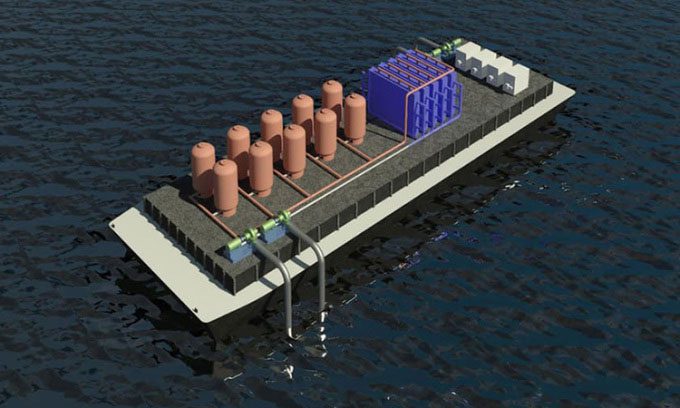A team of experts at the Massachusetts Institute of Technology (MIT) has developed a new system for extracting carbon from seawater at an optimized cost of approximately $56 per ton of CO2.
As carbon concentration in the atmosphere increases, CO2 begins to dissolve into the ocean. The oceans are currently absorbing about 30-40% of annual human carbon emissions and maintain a continuous exchange with the atmosphere.

MIT’s mobile carbon recovery system from seawater. (Photo: MIT).
Direct air capture of carbon is often expensive and energy-intensive. Instead, scientists have devised a solution to extract carbon from seawater, allowing the ocean to absorb additional carbon from the atmosphere to rebalance the concentration. Currently, the CO2 concentration in seawater is more than 100 times that in the air.
Previously, several research groups had successfully separated CO2 from seawater for capture, but their methods required expensive membranes and a continuous supply of chemicals to sustain reactions, as reported by New Atlas on February 18. In their recent study published in the journal Energy and Environmental Science, the MIT team stated that they successfully tested a system that does not require either of these components and consumes significantly less energy compared to direct air capture methods.
In MIT’s system, seawater is passed through two chambers. The first chamber uses reactive electrodes to release protons into the seawater, acidifying it and converting dissolved inorganic bicarbonate into CO2 gas, which then rises and is captured by a vacuum system. The water is then pushed through the second chamber with a reversed voltage, pulling the protons back and converting the acidic water back to alkaline before pumping it back into the ocean. When the electrodes are depleted of protons, the voltage polarity is reversed, and a similar process continues with the water flowing in the opposite direction.
The research team reported that the new method requires an input energy of only 122 kJ per mole of CO2, equivalent to 0.77 mWh per ton of CO2, and believes it can be further improved for even greater energy efficiency. They also anticipate that the optimized cost will be around $56 per ton of captured CO2.
The amount of carbon accumulating in the ocean has been increasing in recent years, leading to acidification issues that threaten coral reefs and shellfish. The alkaline water generated from this new method, if directed to the right areas, could help restore balance.
The research team plans to conduct a real-world verification project over the next two years and acknowledges that there is still much work to be done. For instance, they hope to extract the gas without the need for a vacuum system and address the issue of mineral precipitation that contaminates the electrodes during the alkalization process.


















































